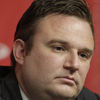
[ad_1]

Enes Kanter of the Boston Celtics has not shied from political activism.
Mike Ehrmann/Getty Images
hide caption
toggle caption
Mike Ehrmann/Getty Images

Enes Kanter of the Boston Celtics has not shied from political activism.
Mike Ehrmann/Getty Images
On Wednesday afternoon, Enes Kanter, a center for the Boston Celtics, traded his uniform for a t-shirt bearing an image of the Dalai Lama, and read a pro-Tibet message that has prompted Chinese broadcasters to take the Celtics off the air in China.
“My message for the Chinese government is ‘Free Tibet.’ Tibet belongs to Tibetans,” Kanter said in the video, describing restrictions, imprisonment and “cultural genocide” he attributed to Chinese rule and calling Chinese President Xi Jinping a “brutal dictator.”
“After learning all of this, I cannot stay silent. I stand with my Tibetan brothers and sisters, and I support their cause for freedom,” he said.
With the video, Kanter waded into the long-running debate over the sovereignty of Tibet. Internationally, the region is recognized as part of the People’s Republic of China. But Tibetans disagree; since 1959, a Tibetan “government in exile” based in India has protested what it calls an illegitimate colonial rule.
Now, all Celtics games have been removed from Tencent, the huge Chinese streaming platform that carries NBA games. Neither the NBA nor Tencent has released a public statement on the situation, nor did either immediately respond to NPR’s request for comment.
“[Kanter] was clout-chasing, trying to get attention with Tibet-related issues. His wrong remarks are not worth refuting,” said Wang Wenbin, the spokesperson for China’s foreign ministry, at a press conference Thursday. “Tibet is part of China.”
Kanter has spoken out against autocracy before
It is not the first foray into pro-democracy activism for Kanter, who was born in Switzerland to Turkish parents.
His critical comments about the regime of Turkish President Recep Tayyip Erdoğan have caused Turkish authorities to revoke his passport and demand his extradition to Turkey, where he has been indicted for alleged involvement with a terrorist organization. Kanter denies the charges and says they are politically motivated.
But with his comments about Tibet, Kanter has waded into an especially sensitive subject for the NBA, as China is by far the league’s largest foreign market.
The NBA, perhaps the most politically progressive men’s professional league in the U.S., has long fostered a culture where players feel free to voice their opinions on issues like police brutality, racial justice and presidential elections.
Kanter is not the first NBA player or official to anger China
But players and staff have repeatedly run into trouble when criticizing China, whether about Tibet or pro-democracy protests in Hong Kong.
In 2019, as the protests in Hong Kong were at their peak, Daryl Morey, then the general manager of the Houston Rockets, posted an image to Twitter that read “Fight for freedom, stand with Hong Kong.”
On mainland China, the backlash was immediate — and especially notable because the Houston Rockets had long been China’s most popular NBA team, thanks to a Hall of Fame-level career by Chinese basketball icon Yao Ming.
After Morey’s tweet, the Chinese Basketball Association, led by Ming, cut ties with the Rockets. The Chinese consulate in Houston issued an anti-Rockets statement. Chinese businesses removed Rockets merchandise for sale. Tencent delisted Houston games and China Central TV canceled NBA broadcasts.
Afterward, the NBA called the tweet “regrettable,” and Morey apologized after deleting the original tweet.
“I did not intend my tweet to cause any offense to Rockets fans and friends of mine in China. I was merely voicing one thought, based on one interpretation, of one complicated event,” he wrote.
1/ I did not intend my tweet to cause any offense to Rockets fans and friends of mine in China. I was merely voicing one thought, based on one interpretation, of one complicated event. I have had a lot of opportunity since that tweet to hear and consider other perspectives.
— Daryl MorΞy 🗽🏀 (@dmorey) October 7, 2019
Two years later, Tencent still does not offer streams of the Philadelphia 76ers, where Morey now works as the president of basketball operations.
The NBA is far from the only sports league to face backlash in China after critical comments by players.
After Arsenal star Mesut Özil spoke out against the treatment of the Uighur Muslim minority in China, the Premier League’s broadcast partners in China refused to show the team’s matches. Arsenal publicly distanced itself from the comments before benching Özil. He left the team earlier this year.
[ad_2]
Source link

